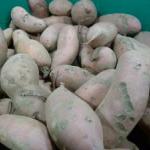Sweet Potato Harvest and Storage
Sweet potatoes are becoming an increasingly popular crop to grow, with strong market interest from consumers. Their harvest and storage needs differ from other common New England root crops.
Sweet potato roots continue to grow until the leaves are killed by frost or until soil temperatures fall consistently below 65F, whichever comes first. Time of harvest is often determined by digging up a few representative plants and determining the percentage of roots in the size classes.
When tops of the plants turn black after the first frost, it is imperative to harvest as quickly as possible regardless of root size.
Sweet potatoes are very susceptible to damage at harvest. Sweet potato roots do not have a thick protective outer layer of cells such as that on white potato tubers. Abrasions and wounds can lead to rots in storage.
Curing immediately after harvesting is recommended when selling sweet potatoes wholesale. This minimizes damage and loss during storage by healing harvest wounds. To cure, maintain roots in temperatures between 80°F to 86°F and a high relative humidity (85-95) for 4 to 7 days. This forms a corky periderm layer below the damaged areas which limits microbial invasion and water loss. A freshly harvested sweet potato is more starchy than sweet. During curing and storage, starches in the sweet potato are converted to sugars, improving flavor. It is recommended to wait at least three weeks after harvest before consuming sweet potatoes to permit the starches to convert to sugars for maximum eating quality.
Sweet potatoes can maintain excellent quality for up to a year in proper storage conditions. The ideal storage conditions for sweet potato are the same as for winter squash; moderately warm (55-60F) at 60-75% relative humidity.
- excerpted from the New England Vegetable Management Guide, nevegetable.org.
The Center for Agriculture, Food and the Environment and UMass Extension are equal opportunity providers and employers, United States Department of Agriculture cooperating. Contact your local Extension office for information on disability accommodations. Contact the State Center Director’s Office if you have concerns related to discrimination, 413-545-4800 or see ag.umass.edu/civil-rights-information.
